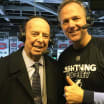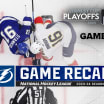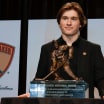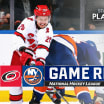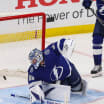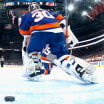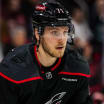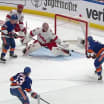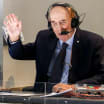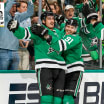World Juniors provides U.S. coach with second chance at title
Sandelin on pressure, growth of tournament in discussion with NHL.com
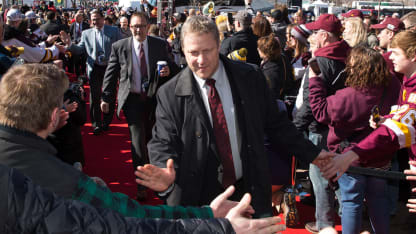
© Richard T Gagnon/Getty Images
Sandelin, in his 20th season as coach at the University of Minnesota Duluth, last served as U.S. coach in 2005 when the Americans finished fourth. He was an assistant at the 2012 WJC (seventh place) and 2019 WJC (second place).
"One of the biggest things I learned the first time is you're not coaching your own team, so I think that's something that stuck with me," said Sandelin, who has won three Division I national championships at Minnesota Duluth. "Having gone through it a second time as an assistant, you learn from guys you work with. That experience of going through it, being behind the bench (at Minnesota Duluth) for 20 years in bigger games, helps. I hope I'm in a better spot and I'll rely on the people around me; we've got a great staff."
He expects to have his players ready from the start, especially since the U.S. begins round robin play against rival Canada in Group B at Ostravar Arena in Ostrava, Czech Republic, on Thursday (1 p.m. ET; NHLN). The United States seeks a fifth straight top-three finish at the event, which will be held in the Czech Republic from Thursday to Jan. 5, 2020, after winning it in 2017, finishing second in 2019 and third in 2016 and 2018.
"The players know what has transpired the past four years and now we're trying to build on that," Sandelin said. "It's not easy to medal in this tournament. There's also pressure, but pressure can be taken two ways ... you can let it get to you or use it as good motivation and I think this group will use it as good motivation to continue that trend."
Sandelin discussed the WJC, his thoughts on the U.S. team, and the possibility of one day coaching in the NHL in an interview with NHL.com.
What do you like about this year's group of U.S. players?
"I think we've got really good balance. I think there's a lot of versatility and I like the fact a lot of them are riding a high level of confidence. We've got some younger guys who, up front, probably are a little bit different than maybe those we had in the past. In some years we've had a little older team, as far as guys with that experience. Some of these guys have gone through the first half of their years (of college) and they've improved and learned some lessons. This is a nice time to get players because it's not the summer, it's a little more mid-season, and they all are a little more in their hockey form."
Do you feel the WJC is becoming as popular in the United States as it is in Canada?
"I hope we can get it to the level that it is in Canada. I mean this is what Canadians always look forward to, but there's no question I think hockey in general in our country has grown. The NHL has helped that too, but I think the success our programs have had over the last four or five years makes it an exciting time for people to watch and we've got a lot a lot of college guys, too, so there's that interest from those fans. But, yes, I do think it's growing, and has been gaining traction."
If given the opportunity, would you consider coaching in the NHL?
"I got an opportunity to interview with the Anaheim Ducks last year, which was a good experience for me. If someone calls, I'm certainly going to listen. But going into that interview, it's nice knowing you have a pretty good job. There's obviously interest there but I certainly like what I'm doing now, I like working with the players of that age group and it's nice to be around the kids for two, three, four years and hopefully have a little bit of an impact on their life. It's something that probably, over the last five years, I've thought about. I've been asked to be an NHL assistant in a couple places, but I stayed where I was and not because I didn't want to do it, the timing, or family-wise. Five years ago, I got asked and I never really gave it much thought. I did when I first got into coaching, because when you're done playing, you want to get right back in. But it is something I'd be interested in if it came along again."
Who were your mentors prior to coaching?
"I've had a lot of really good coaches that you learn from. I had some good youth coaches but when I got to the University of North Dakota, having (Gino) Gasparini, Dean Blais, John Marks, and graduate assistant Cary Eades was great. I was fortunate. In pro hockey, I played for a lot of different guys, but I really liked Pat Burns when I played for him in Sherbrooke (of the American Hockey League). Pat made me captain in Sherbrooke and I just had a lot of respect for him. I also played for Mike Eaves (Hershey, AHL), Kevin McCarthy (Hershey), and John Paddock (Hershey) so I had a different coach every year. I think you take a little bit from all those guys. I really entrusted and called Gino, John or Dean all the time. Those guys really were instrumental."
What memories do you have as coach of the U.S. in the 2005 WJC?
"I remember that it was really cold in Grand Forks, North Dakota, but it was my old stomping grounds. We were coming off the gold medal in Finland so there was that pressure, but I was hoping we'd get some of the guys during the NHL work stoppage as some of the other teams did, especially (first place) Canada, with Sidney Crosby, Ryan Getzlaf, and Patrice Bergeron. I think as a coach I learned a lot from that tournament because I realized how big it had gotten -- and this is 15 years ago. I remember playing in the WJC in 1984 in Sweden and it was a big thing but it's not as big as it is now. I realized how good the players were and it continues to get better. I think taking some of the experiences from the coaching side of it, was good to go through. Now that I've personally been through it a few times, I feel a lot more comfortable with being at this tournament."

